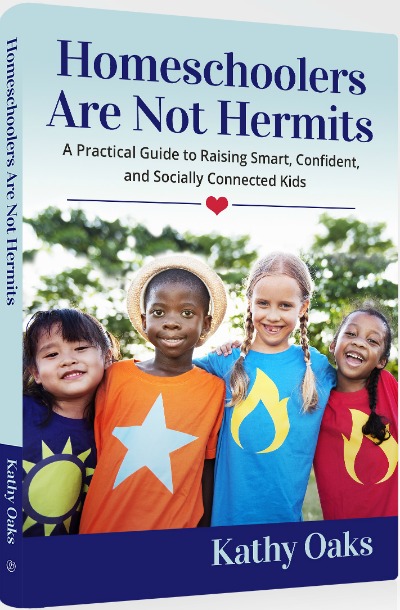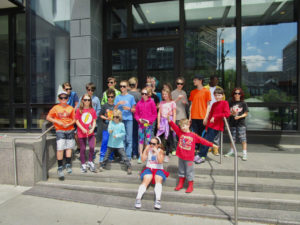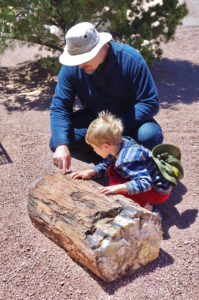
Why I wrote my book
I decided to write about our experience because so many people have helped our family along our homeschooling journey, and because whenever I meet someone just beginning the process I want to help them, too. And not only beginning homeschoolers. I love knowing that I’ve made a difference, even if it’s just a little bit. I find myself jumping in to online conversations to add my two cents, and if I had the time (and they had the patience) I would easily make it my two dollars. It feels like I can’t help enough. I always want to hold people’s hands along the way and reassure them that it’s not nearly as big and scary and complicated as it may seem at the start.
Then it occurred to me that I could write it all down in one place, all the advice and experience and resources that have helped me, and in this way help other people. Those just starting out on the homeschooling journey have more immediate questions and fears than those farther along, but I have found that no matter how many years of homeschooling experience any of us have, we can always learn more from each other and contribute a little something as well.
“But my child is so social!”

Another reason I wrote my book is to counteract a lot of false ideas people have about homeschooling, many of which keep people from seeing it as a viable option for themselves. I can’t tell you how many times I’ve heard, “I’d love to homeschool, but my child is so social!” Homeschooling doesn’t have to be school-at-home. It doesn’t look like a mini-classroom with desks and children doing workbooks and the parent lecturing at the front of the room for eight hours. That would be boring and tedious and hard and stressful for kids and parents alike. Homeschooling also does not have to stunt your family socially, unless you absolutely insist on school-at-home with no extracurricular activities. That’s right, homeschoolers are not hermits. Bear in mind that until about 200 years ago, the vast majority of humanity was well-socialized without school, and even when compulsory schooling arrived it didn’t require the huge amount of time (and homework) that it does today. Education does not have to take up 30-60 hours a week for 12-16 years, nor does it require that children memorize a bunch of facts just so they can regurgitate them on a test. Learning can and should be enjoyable, and it can look however your family wants it to look. If your kids really want to do workbooks for eight hours a day, then let them try it for a day or two. Just make sure you don’t force them into it, and that you take a break from it and get them out of the house for some fun on a regular basis. Helping children learn how to reason, to think critically, and to put together facts to create new ideas and concepts makes learning fun.

Homeschooling for educational reasons
Also, there seem to be fewer books (and sites and groups) for secular homeschoolers than there are for those who identify religion as their main reason for homeschooling. I don’t mean to imply this book is intended only for people who are non-religious. What I mean is that religion is not brought into the equation. Our spiritual practices are separate from our educational practices, and that is intentional. We prefer to expose our kids to a variety of beliefs and discuss them as they are relevant to other people’s lives and our own. One of my homeschooling friends summed it up like this: “I pray with my prayer group, I come to get homeschool support in my homeschooling group.” We are ethics- and science-based homeschoolers. If you would like to read books on how to incorporate your spiritual practice into your daily education, there are plenty to choose from. My book was written, in part, as a secular alternative. As a side note, when I say there are plenty of books on spirituality and religion, I do mean plenty. In a bookstore once I found a book titled Pagan Homeschooling. Sure enough, it was all about how to incorporate pagan spiritual practice into your daily homeschooling life. Naturally, your spiritual side may inform your life, but that is personal, and beliefs vary widely among people. In my book I do not presume to tell you how to meld your spiritual practices with your education.
Our parenting style

A lot of my book has to do with our parenting style. Because our kids are at home with us so much of the time, it’s hard to avoid the subject. Our goal is to help our kids to become self-sufficient, creative, interesting, kind, mindful, giving, and effective members of society. It’s not to make them obedient or to protect them from ideas (although protecting them from mean people is right up there on our list). We strive for respectful and cooperative parenting, although we often fall back on authoritative (as opposed to authoritarian) parenting when at a loss. One of my goals in writing is to show you that nobody is perfect, that it’s natural to make mistakes along the way, and that the best approach is always to relax and deal with the issue calmly. Don’t waste time beating yourself up for making mistakes. We all make mistakes. What has worked well for our family is to be mindful when problems arise, discuss the problem together, and all brainstorm for solutions. Remember, most of the stories you read from homeschoolers are about their best days, not their worst. Homeschoolers generally save their bad day stories to share with their support groups, not to publish on a blog. H
Helping others
Writing my book was a way to make a difference, to help other people in their homeschool journey, and give as many people as possible my list of favorite resources for both education and parenting. I hope you enjoy it, and that it makes a difference for you!
Leave a Reply